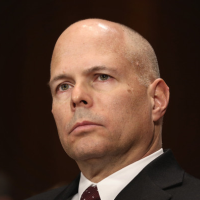Judge Rules Wisconsin Photo ID Law Unconstitutional...but Good Enough for November Election
 Judge James Peterson (photo: Alex Wong, Getty Images)
Judge James Peterson (photo: Alex Wong, Getty Images)
By Molly Wilms, Courthouse News Service
MADISON, Wis. (CN) — A complete overhaul of Wisconsin's unconstitutional voter-identification scheme is not necessary before Election Day, a federal judge ruled, finding that existing emergency measures are enough to protect qualified voters.
Passed in 2011 following the election Gov. Scott Walker, the Republican-backed Act 23 requires voters to show photo identification at the polls. Activists led by the group One Wisconsin Now have been fighting the law for years, saying it disenfranchises various qualified voters including older black citizens born in the South who were never issued a birth certificate and have been unable to get a valid Wisconsin photo ID.
Though the law was in effect during the April primaries, U.S. District Judge James Peterson took aim last month against several unconstitutional provisions of the law — namely the restrictions on early voting hours, the elimination of weekend voting, and restrictions on the use of student IDs for voting.
Peterson chastised lawmakers for targeting the state's large black community in Milwaukee with no valid purpose, but Wisconsin insists it will prevail on appeal.
The state demanded that Peterson stay his injunction (pdf) to avert an unnecessary overhaul of state election procedures, but Peterson mostly denied the request Thursday.
Saying Wisconsin is exaggerating the breadth of his order, Peterson noted that the "injunction requires modest, but meaningful, adjustments to a few election procedures and requirements."
Though Peterson said the there is little evidence that the state will prevail in its appeal, he did agree that Wisconsin need not yet fundamentally reform the "ID petition process," something the July 29 ruling called "pretty much a disaster."
Abbreviated in the court record as IDPP, Peterson noted that the process requires "on average, five communications with the [Department of Motor Vehicles] after the initial application to get an ID."
Peterson emphasized Thursday that his feelings about IDPP have not changed.
"To be clear: the state must reform the IDPP because the current process prevents some qualified electors from getting acceptable IDs, and even successful petitioners must often endure undue burdens before getting those IDs," the opinion states. "But the state's emergency measures already in place will allow anyone who enters the IDPP to get a receipt that will serve as a valid ID for the November 2016 election. This is not a permanent solution because the long-term status of the receipts is uncertain. But the required reform can wait until the parties complete their appeal.
Peterson wrote that a stay "blunts the constitutional injury to those who are stuck in the IDPP," letting people who are awaiting a ruling on their identification to get a receipt, valid for up to 180 days, from the state allowing them to vote without ID."
"This is not a permanent solution because the long-term status of the receipts is uncertain," Peterson wrote. "But the required reform can wait until the parties complete their appeal."
Attorney General Brad Schimel saw the decision as a victory.
"For the second time in three days, a court has granted our motion for stay in a case challenging Wisconsin's voter ID laws and we are very pleased with this Court's decision to allow this law to be in effect for the November 2016 election," Schimel said in an email to reporters.
One Wisconsin Now deputy director Mike Browne meanwhile said the latest ruling speaks for itself, quoting Peterson's finding that "Defendants have not made a strong showing that they are likely to succeed on the merits of their appeal: the court is not persuaded that any aspect of its decision was wrong."
"If [Brad Schimel] calls this a win, we'd be interested to see what he considers a loss," Browne said in a phone interview.
To Learn More:
Seeing Intentional Effort to Suppress Black Vote, Judge Strikes Down Part of Wisconsin Voter ID Law (by Jack Bouboushian, Courthouse News)
15 States Wielding New or Stricter Voter ID Laws in Run-Up to Presidential Election (by Michael Wines and Manny Fernandez, New York Times)
State Courts Versus Republican Efforts to Limit Voting: Wisconsin (by Noel Brinkerhoff, AllGov)
- Top Stories
- Unusual News
- Where is the Money Going?
- Controversies
- U.S. and the World
- Appointments and Resignations
- Latest News
- Trump to Stop Deportations If…
- Trump Denounces World Series
- What If China Invaded the United States?
- Donald Trump Has a Mental Health Problem and It Has a Name
- Trump Goes on Renaming Frenzy






Comments